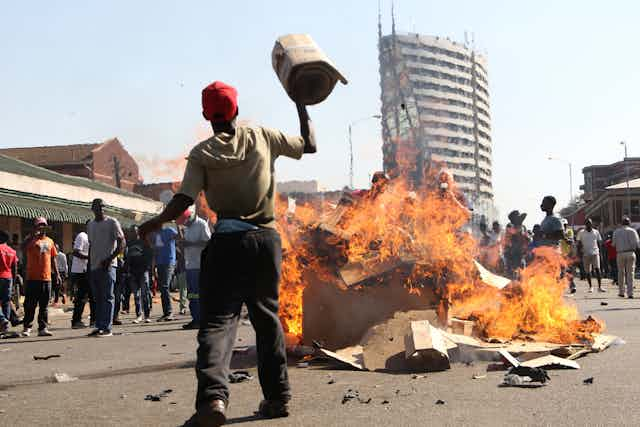The counting of the votes in the Zimbabwean elections lurched from tragedy to farce. The tragedy came when military over-reaction left three demonstrators dead. Soldiers had fired into the crowds that were gathering outside the Electoral Commission, accusing it of counting too slowly and with having a bias towards the government.
Indeed it seemed the Electoral Commission was trying to stage manage the process of counting and announcing the results. It released the parliamentary results first – revealing a two-thirds majority for the ZANU-PF government. That was seen as a psychological ploy to dampen opposition (MDC) expectations of a presidential victory for its youthful candidate, Nelson Chamisa.
If that was the intention, it served only as incitement – and angry crowds gathered outside the Commission’s headquarters. Although water cannon trucks were on standby, the police also stood by as soldiers swept into the area on armoured vehicles and trucks with guns blazing as they hurtled down the streets. It was a disaster for the image of the “reformed” ZANU-PF. All the pragmatism and near-liberalism projected by president Emmerson Mnangagwa disappeared in the gun smoke and tear gas. Instantly, all the foreign observer groups injected a new note of concern and a degree of scepticism into their preliminary judgements of the election.
Among the observers were two former African presidents – John Mahama from Ghana and Ellen Johnson Sirleaf from Liberia. Both had stood down gracefully after electoral defeat in their own countries – and they brought gravitas to their concerns that, although this election was a huge improvement over previous ones, there were still shortcomings in preparations by the Electoral Commission. And while the playing field was more level for the opposition than it had been in the past, it remained uneven. The implication was that the observer reports would stop shy of declaring the elections free and fair.
In the end, the perceived, alleged, and actual shortcomings of the Electoral Commission were such that Mnangagwa’s narrow presidential victory – 50.8% (2.46 million votes) to Chamisa’s 44.3% (2.14 million votes) – meant he just avoided having to take part in a run-off vote. Were irregularities just enough for his extra 0.8%?
Scraping through
To be fair, if ZANU-PF had been rigging the election, it would have been much harder to disguise than in the past. Observer groups and embassies brought in computer experts who were hard at work in back rooms checking all the figures. A count of 49% to 50.8% would have been well within their margin of error. But ZANU-PF would not have rigged things with avoiding a runoff in mind. The accusations in the past were against efforts to win by comfortable to large margins. The clear late surge by Chamisa confounded almost everyone’s pre-poll predictions and caused enough panic in the minds of the government for someone high in its ranks to send in soldiers with deadly intent.
The overwhelmingly critical reaction from observers and foreign governments made a repetition of deadly intent impossible. Even so, the Electoral Commission finally released the presidential results in the dead of night with the centre of the city of Harare under lockdown. It was like a Shakespearian play where the ghosts of the dead hovered over what was meant to have been a ZANU-PF triumph. It became a scrape-through under cover of darkness.

The MDC will challenge the count in the courts, but may have difficulty in providing clear evidence for its claims. There are rumours flying that Chamisa will be offered a seat in an inclusive government. Whether or not that happens, Mnangagwa must now be seen as the last of the ZANU-PF liberation figures to become president. He is in his 70s. The country hungers for fresh ideas. The young want jobs, not war stories from the past. Mnangagwa’s deputy, the former army general Chiwenga, has no civilian common touch and is unpopular. ZANU-PF would itself have to make a generational jump to avoid the repetition of old men like Mugabe going on and on for election after election.
As for Chamisa, can he keep his MDC together? He is young and talented, if maladroit and terrifyingly raw – but he lacks talented youth for his front bench. His team is instead made up of opposition veterans who hate each other. He too may have to force a generational jump.
In Zimbabwean political history since 1980, the old resist needing to go. Chamisa is no Justin Trudeau, Emmanuel Macron or Jacinta Adern. But he will need to reinvent himself and his party to become more like the youthful trailblazers of a new international politics. Mnangagwa can try to repair the damage to his efforts to reinvent his and his party’s image, but he cannot become youthful again. He might truly go down in history as the last of the ZANU-PF liberation leaders.

